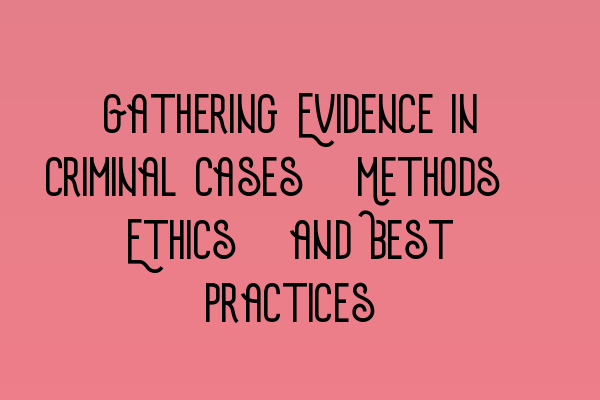Gathering Evidence in Criminal Cases: Methods, Ethics, and Best Practices
Welcome to the SQE Criminal Law & Practice Law UK blog. In this post, we will delve into the importance of gathering evidence in criminal cases, discussing various methods, ethical considerations, and best practices.
Why is Gathering Evidence Crucial in Criminal Cases?
In criminal cases, the gathering of evidence plays a pivotal role in determining guilt or innocence. It assists in establishing the facts, corroborating witness testimonies, and enabling a comprehensive understanding of the events that transpired. Without proper evidence, it becomes challenging to present a strong case in court.
At SQE Criminal Law & Practice Law UK, we understand the significance of thorough evidence collection. Our workshops and seminars on criminal practice (link: Workshops and Seminars on Criminal Practice: Expanding Your Expertise) provide legal professionals with in-depth knowledge and practical skills to enhance their abilities in gathering evidence effectively.
Methods of Gathering Evidence
There are various methods employed to gather evidence in criminal cases. These include:
- Witness Interviews and Statements
- Forensic Analysis
- Video and Audio Recordings
- Physical and Digital Evidence Collection
- Surveillance and Undercover Operations
Each method has its own benefits and limitations, and it is crucial for legal professionals to adopt a multidisciplinary approach when gathering evidence to ensure its authenticity and admissibility in court.
Ethical Considerations in Evidence Gathering
Evidence gathering must be conducted within the boundaries of ethical principles. Respecting the rights of individuals, privacy concerns, and maintaining confidentiality are central to conducting a fair and just investigation.
As legal professionals, it is our responsibility to uphold the highest ethical standards while gathering evidence. Staying updated on the latest updates in UK criminal laws (link: Updates in UK Criminal Laws: Staying Informed and Prepared) is essential to ensure compliance with legal requirements and safeguard the rights of all parties involved.
Best Practices for Evidence Gathering
To ensure the effectiveness of evidence gathering, it is essential to follow best practices. These include:
- Adhering to Legal Procedure and Protocols
- Maintaining a Chain of Custody for Evidence
- Documenting and Organizing Evidence
- Using Technology to Enhance Evidence Collection
- Collaborating with Experts
By following these best practices, legal professionals can maximize the value of the evidence gathered and create a strong foundation for their case.
At SQE Criminal Law & Practice Law UK, we believe in enhancing the SQE criminal law study group experience (link: Enhancing Your SQE Criminal Law Study Group Experience) by promoting active discussions and knowledge sharing on evidence gathering methods and best practices.
Conclusion
Gathering evidence in criminal cases is a critical aspect of the legal process. It requires careful planning, adherence to ethical principles, and the use of best practices. At SQE Criminal Law & Practice Law UK, we are dedicated to providing legal professionals with the knowledge and skills required to excel in evidence collection.
If you are interested in a detailed analysis of criminal evidence rules, be sure to check out our article on “Decoding Criminal Evidence Rules: A Detailed Analysis” (link: Decoding Criminal Evidence Rules: A Detailed Analysis).
For a deep dive into fraud and financial crimes in the UK, don’t miss our article on “Deep Dive into Fraud and Financial Crimes in the UK” (link: Deep Dive into Fraud and Financial Crimes in the UK).
Thank you for reading and stay tuned for more insightful content from SQE Criminal Law & Practice Law UK!
